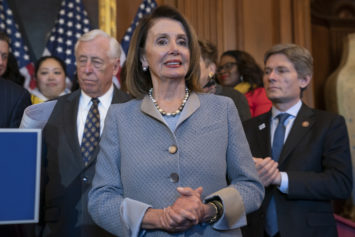Though the official launch of President Obama’s universal healthcare plan is a big enough deal to move Republicans to shut down the entire federal government to stop it, in reality Obamacare will only be relevant and important to just 15 percent of the population—those people who currently don’t have healthcare or who buy it on the individual market because they don’t get it through their employer.
For 85 percent of Americans who have health benefits through their jobs, Obamacare won’t require them to do anything at all.
But as the media and Republicans search desperately for glitches in the roll-out of the program, the more people who flood the website healthcare.gov today, the more likely it is that the site will have operational difficulties.
Health and Human Services Secretary Kathleen Sebelius has anticipated technical glitches that are sure to accompany the introduction of such a massive program, particularly one whose success starts at a website that the entire country will be visiting. She asks the public for the same patience it affords a company like Apple when a new product is launched.
“We’re building a complicated piece of technology,” Sebelius said, “and hopefully you’ll give us the same slack you give Apple.”
She went further into the analogy by talking about Apple’s new operating system, iOS 7.
“I clearly have an iPad and I also have an iPhone and about 10 days ago I got the prompt that the operating system had changed,” she said yesterday during a meeting with reporters.
Sebelius said she agreed to the iOS 7 upgrade. But then a couple of days later, she received a new message that said, “now we have a new, new upgrade and why don’t you re-upgrade your upgrade.”
Sebelius said this sort of thing happens all the time with technology — new software releases are usually followed by bug fixes once it’s out in the field. Sometimes quite a few bug fixes. But people don’t run around whining about how the whole system is inoperable, just because of a bug or two.
Instead, she said, “everyone just assumes ‘well there’s a problem, they’ll fix it.'”
Sebelius’ warning was realized this morning, as the site moved extremely slowly shortly after 8 a.m., at one point stopping on a screen that urged users to have patience because of the high numbers of visitors.
But once the system is up and running smoothly, not only will it be a boon to individuals without health insurance, a number that exceeds 45 million, but it will likely benefit the entire economy. People will no longer be tied to their jobs because of the health benefits, and no longer be afraid to start up their own businesses or move to another state because they will always have the guarantee of good quality, low-cost health care through the exchanges.
The plans are categorized by metal levels, from bronze to silver to gold to platinum. The bronze plans will have lower monthly premiums but higher out-of-pocket costs, while gold and platinum plans will have higher premiums and less out-of-pocket spending.
The law requires all legal U.S. residents to obtain health coverage or face a tax penalty. Depending on your age, your income, where you live, whether you use tobacco and how much coverage you desire, there is a vast range in how much you will have to pay.
There will be an estimated 106 health-plan choices in Arizona and 102 in Florida, while Alabama will have just seven — the lowest number in the country. Most states offer choices in the range of 40 or 50 possible plans.
A government report estimated the average monthly price in the nation for the lowest cost silver plan at $310, with the second lowest cost silver at $328, and the lowest cost bronze at $249. But the averages are virtually meaningless because prices will vary drastically depending on individual circumstances.
In addition, low-income families and individuals will be eligible for subsidies that can drastically lower the cost of premiums — i.e, a family of four in Dallas with a $50,000 household income could choose a bronze plan for as little as $26 a month, including the subsidies; $36 a month in Charlotte, N.C.; $32 a month in St. Louis; and $24 a month in Ft. Lauderdale, Fla., all including subsidies.
In a story on how Obamacare helps black women, the Root said it gives them better access to life-saving checkups, better access to birth control because it requires insurers to cover birth control as a form of preventive care, and it gives the same care at the same cost to those with pre-existing conditions, including the nearly 5 million African-Americans, 18.7 percent, who suffer with diabetes.

